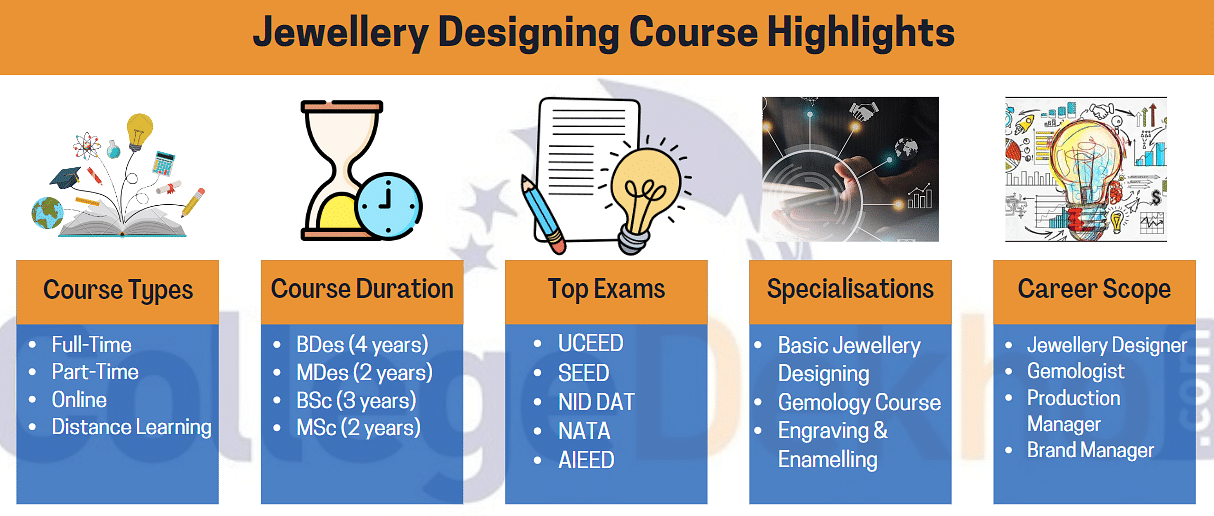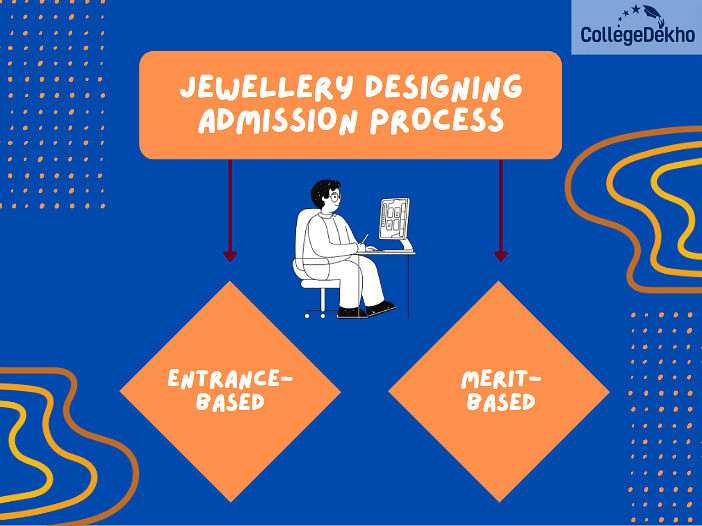Jewellery Designing Course
A Jewellery Designing course professionally trains students to design intriguing jewellery pieces, their ideation and finalising. The course is offered at various academic levels and may last 2-4 years. Students can also study this programme online if they satisfy the eligibility criteria their preferred institution requires.
Jewellery Designing Course Overview
Jewellery designing courses are professional academic programmes where the candidates are trained to design and create jewellery professionally. Studying this course requires technical expertise and the candidates who pursue this course are trained in a professional environment as the entire process of making jewellery is quite complex. A Jewellery Designer is accountable for ideation and finalising the design. They are trained persons who have architectural as well as functional knowledge of different materials, compositions, fabrication techniques, wearability as well as market trends.
One can pursue a course at the undergraduate (UG) or postgraduate (PG) level to become a Jewellery Designer. While different courses have different eligibility requirements, in general, students must pass a design entrance exam and have at least 50% in their 10+2 exams to be considered for admission to top jewellery design colleges. One can also pursue different certificate and diploma courses in Jewellery design apart from degree courses available at undergraduate and postgraduate levels. Some top colleges that offer Jewellery designing courses are NIFT Gandhinagar, Thiruvalluvar University, Pearl Academy Delhi, GLS University, etc. A fresher jewellery designer can expect to make between INR 2-4.5 LPA. Where, freshmen can improve their skills by learning Adobe Software, Computer-Aided Design (CAD), and 3D Rendering as they are expected to offer an average salary of INR 5-8 LPA.
Table of Contents
- Jewellery Designing Course Overview
- Jewellery Design Course Highlights
- Why Choose a Jewellery Designing Degree?
- What is an Online Jewellery Designing Degree?
- What is the Difference Between BDes in Jewellery Designing and Diploma in Jewellery Designing Courses?
- Types of Jewellery Designing Courses
- Jewellery Designing Courses Eligibility Criteria
- Jewellery Design Entrance Exams
- List of Popular Jewellery Designing Course Specialisations
- Jewellery Designing Course Admission Process in India
- Jewellery Designing Course Fees in India
- Jewellery Design Course Syllabus/Subjects
- Top Private Jewellery Designing Colleges in India
- Top Government Jewellery Designing Colleges in India
- Top Jewellery Designing Colleges Offering Direct Admission in India
- Career Options After Jewellery Designing Courses
- Courses After a Jewellery Designing Degree
- FAQs about Jewellery Designing
Jewellery Design Course Highlights
Given below are some important Jewellery designing course highlights:

| Particulars | Details |
|---|---|
| Course Name | Jewellery Design |
| Courses Offered | BDes, MDes, BSc, MSc |
| Eligibility Criteria | BDes and BSc (10+2 any specialisation) |
| MDes and MSc (Bachelor's degree) | |
| Course Durations |
|
| Admission Process | BDes and BSc (Based on Entrance test / Merit) |
| MDes and MSc (Based on Entrance test / Merit) | |
| Top Entrance Exams | UCEED, SEED, NID DAT, NATA, AIEED, CEED, etc. |
| Course Fees | BDes and BSc (INR 20,000 to INR 1,00,000 per year) |
| MDes and MSc (INR 2,00,000 to INR 3,00,000 per year) | |
| Top Colleges | Arch Academy of Design, Pearl Academy of Fashion, National Institute of Fashion Technology, Rashtrasant Tukadoji Maharaj Nagpur University, Indian Institute of Crafts & Design, MIT World Peace University, etc. |
| Career Options | Visual Merchandiser, Gemologist, Retail Store Manager, Production Manager, Brand Manager, Jewellery Designer, etc. |
| Average Salary | INR 8 LPA |
| Top Recruiters | Inter Gold India Limited, Schachter Jewellery, P C Chandra Jewellers, Kalyan Jewellers, Myntra, Malabar Gold and Diamonds, Amrapali Jewels, Orra Jewellery, Tanishq, Gitanjali Jewellers, etc. |
Also Read: List of Jewellery Designing Courses in India
Why Choose a Jewellery Designing Degree?
A career in jewellery designing is an excellent choice for someone who enjoys making jewellery. Candidates can start a lucrative career in this industry by developing new jewellery designs with their inventive and creative abilities. The jewellery design course covers both theoretical and practical aspects of jewellery design. These aspects include fabrication methods, market trends, composition, wearability, and the examination of various precious metals, gems, and jewels. The following infographic will help you find some quick reasons to choose a jewellery designing course:

Many people are wearing jewellery for both personal and professional reasons, which is expanding the number of career opportunities for jewellery designers. Some of the most important reasons for a candidate to enrol in a jewellery design course are as follows:
- The jewellery designing courses cover all aspects of the jewellery-making process. Candidates are taught about all of the important aspects of jewellery designing.
- Top companies or brands in India and abroad may recruit jewellery designing graduates.
- Candidates can also start their own jewellery designing business and brand.
- Candidates who have completed a degree course in jewellery designing have a better chance of establishing a successful career in the industry.
- Candidates who enrol in jewellery designing courses gain a variety of new skills necessary for a prosperous professional career, including imagination and innovation, market research, graphic design, and product management, among others.
- In India, the average annual salary for a jewellery designer is around INR 4,00,000. As experience grows, the salary gradually rises.
What is an Online Jewellery Designing Degree?
Candidates can also study jewellery designing online. Sometimes candidates have problems with fees, course location, or time management. In that case, it is possible to take online courses that are both flexible and time-saving. Some top online jewellery designing courses are listed below:
| Jewellery Design in Rhino | Jewelry Making for Beginners Alcohol Ink Pendant Necklace |
|---|---|
| Wire Wrapping Jewellery Making Gutsy Guide – Mastering the Basics | Learn Jewellery Design from Scratch |
| Modnitsa Atelier Jewellery Design Intro Video Series | Jewellery Design Video Course – 23 Steps Lessons |
| Colourful Jewellery – The Comprehensive Jewellery Course | Diamond Basics and Details Retailers Aren't Telling You |
| Jewellery Making for Beginners – Beading Techniques and Statics | Jewellery Rendering with KeyShots |
| Learn the Art of Bobbin Lace Making Beginner Class | Five Ways to Enhance Jewellery Design Through Stone Setting |
| Rhinoceros for Jewellery Design | Making Beautiful Articulated Hinged Jewellery |
| Professional Jewellery Design with Gemvision | Rhino 3D – Jewellery Design in Action |
| Jewellery Design in Rhino from Scratch | DIY Lucky Brooch Clover |
| Wire Crochet Jewellery Courses in 2020 | - |
Also Read: 10 Best Design Courses in India 2024
What is the Difference Between BDes in Jewellery Designing and Diploma in Jewellery Designing Courses?
The BDes in jewellery designing course covers quality assurance, jewellery branding, and commercialisation in addition to the architectural and technical aspects of jewellery design. Students are introduced to the complexities of jewellery design, as well as practical knowledge of the materials and fabrication processes utilised in jewellery design and market trends. On the contrary, a diploma programme in jewellery design focuses on developing a student's creativity and creating innovative jewellery designs. The following table outlines some major differences between the BDes and Diploma in Jewellery Designing courses:
| Differentiating Parameters | BDes in Jewelry Design | Diploma in Jewelry Design |
|---|---|---|
| Course Duration | 3 to 4 years | Varies (6 to 12 months) |
| Level | Undergraduate degree | Diploma or certificate |
| Emphasis | Covers theoretical and practical aspects of jewellery design | Focus on skills and theory |
| Syllabus | Gemology, CAD design, design principles, metalwork, and business aspects. | Focused on hands-on skills and basic jewellery design techniques |
| Admission Criteria | Completed 10+2 with specific subjects or entrance exams | Typically open to candidates with 10+2 qualifications without entrance exams |
| Popular Job Options | Design Consultant, Jewellery designer, Gemologist, or Entrepreneur in the jewellery industry | Jewellery design roles, or working in jewellery workshops. |
| Average Starting Salary | 4-8 LPA | 2-3 LPA |
Types of Jewellery Designing Courses
Jewellery designing courses emphasise both the artistic and technical facets of designing ornaments and other related things this field offers. It teaches candidates the know-how and skills needed to make distinctive and aesthetically pleasing jewellery. They can choose from a variety of course kinds, their specialisation, level of programme, institute type, and more. Depending on their availability, they can study full-time, part-time, online, or distance Jewellery designing courses as explained below.
- Full-time Jewellery Designing Courses: Academic institutions such as universities, colleges, and special design institutes offer full-time jewellery classroom instruction. These courses offer practical training together with in-depth knowledge. Regular instruction is given to students, assisting in focused and organised learning. They can further their careers in jewellery design by participating in workshops, practical design projects, and internships.
- Part-time Jewellery Designing Courses: The ideal jewellery design courses for people with multiple responsibilities and a job are part-time options. They are given adaptable schedules that let them complete their classes or attend lectures on the weekends, in the evenings, or during certain hours.
- Distance Mode Jewellery Designing Courses: Distance learning courses are designed for individuals who prefer independent study. Individuals can access instructional videos, study materials, and assignments remotely with these programmes. Emails, discussion boards, and online forums are the usual means of communicating with aspirants.
- Online Jewellery Designing Courses: Due to the virtual nature of the sessions, students can take advantage of flexibility and convenience when taking online jewellery designing courses. They can access online resources, take part in discussions, and turn in assignments from a distance. Graduates are given the freedom to learn at their speed and convenience as they can access the classes from any location in the world.
Jewellery Designing Courses Eligibility Criteria
The eligibility criteria for jewellery designing courses vary depending on the course. As a result, the eligibility requirements for various jewellery designing courses are listed below, course by course.
Eligibility Criteria for Undergraduate Jewellery Designing Courses
The eligibility criteria for pursuing a jewellery design undergraduate course are as follows:
- Candidates must have completed class 12th in any stream from a recognised board in India.
Eligibility Criteria for Postgraduate Jewellery Designing Courses
The eligibility criteria for pursuing a jewellery design postgraduate course are as follows:
- Candidates applying for postgraduate jewellery design courses in any reputable institution are required to have a Bachelor's degree.
- Applicants must have completed their undergraduate degree in any related discipline or any other discipline at a reputed Indian or foreign institution with a minimum aggregate score of 50%.
Eligibility Criteria for Certificate/Diploma Jewellery Designing Courses
The eligibility criteria for pursuing a certificate/diploma jewellery design course are as follows:
- Candidates must have completed class 10th or class 12th from any recognised board in India
- Candidates must have a minimum required aggregate score in their board examination. Some institutes require candidates to have at least a 50% score in their board examination either in class 10 or class 12.
Required Skill Set for Jewellery Design Courses
A creative mindset is important to have in this jewellery designing course. Along with that, it is critical to have expert knowledge of all the technicalities involved in the jewellery design process. Some of the skills required to complete a jewellery designing course are listed below.
- Detail-oriented
- Organisation and time management skills
- Patience
- Ability to meet deadlines
- Interpersonal skills
- Good imagination power
- Hard work and dedication
- Fair drawing skills
- Good communication skills
Jewellery Design Entrance Exams
The following list includes entrance exams for various jewellery designing programs:
AIEED: The All India Entrance Examination for Design (AIEED) is conducted by the ARCH Academy of Design for admissions to UG and PG design courses. This entrance examination is specially conducted to check the creativity of the candidate in the field of design.
NATA: The National Aptitude Test in Architecture, is conducted by the National Institute of Advanced Studies in Architecture, which is a body of the Council of Architecture, New Delhi in India. This exam is the compulsory entrance exam for securing admission to reputed institutes in the field of architecture. Candidates who possess creative skills, good drawing skills, and strong observation power can easily clear this exam.
NID DAT: The NID Design Aptitude Test commonly known as NID DAT examination consist of a two-tier examination i.e., Preliminary and Mains exam. Candidates who score the required marks in the NID DAT are then provided Jewellery Design course admission in one of the best jewellery design colleges in India.
CEED: The Common Entrance Examination for Design is a joint entrance exam for post-graduate studies in the field of technological design conducted jointly at all IITs and the Indian Institute of Science. In the entrance examination, the candidate's logical reasoning, visual imagination, creative skills and drawing skills are evaluated.
Pearl Academy Entrance Exam: Aspirants must take the Pearl Academy Entrance Exam (also known as the PAF Entrance Exam) and pass it to be considered for admission to any of the design college's programs. After passing the written entrance exam and interview stage, applicants can gain admission to the various UG, PG, and Diploma programs offered at Pearl Academy.
List of Popular Jewellery Designing Course Specialisations
The following table discusses the list of a few popular jewellery designing course specialisations:
| Specialisation Name | Description |
|---|---|
| Advanced 3D Modelling & Production | Gaining knowledge of intricate organic design techniques.
|
| Creative Drawing and Essential Jewellery Knowledge | Drawing realistically, having an in-depth knowledge of forms/ shapes, and paying close attention to jewellery details. |
| Fundamentals of Digital Jewellery Design (CAD) | Methodologies for computer-aided design and production (CAD and CAM). |
| Intermediate 3D Modelling & Gem Settings | Using precise modelling techniques for intricate patterns. |
| Jewellery Illustration, Light and Colour | Applying colour while keeping colour matching in mind to create stunning designs. |
| Jewellery Modelling with non-Jewellery Tools | Describes how to model jewellery without using any tools. |
| Presentation and Layout of Jewellery Designer | Putting on a striking display of intricately designed bracelets, necklaces, earrings, and rings. |
| Technical drawing and Counter sketching | Being aware of the technical facets of sketching, counter sketching, and presenting work to clients. |
Jewellery Designing Course Admission Process in India
Numerous reputable Indian universities accept applications for their jewellery design degrees on a rolling basis. When candidates meet the qualifying requirements, they can enrol in numerous different types of courses. Many top universities that offer admission to jewellery design courses use the results of the most recent entrance exam. Admission to these programmes is granted by various jewellery designing colleges based on counselling or in-person interviews. If you are looking for a short introduction to jewellery designing admissions in India, check out the infographic below.

Merit-Based Jewellery Designing Admission
The score on the entrance exam mentioned above is the basis for admission to several jewellery design courses. Based on their results in prior tests, candidates are also admitted to other jewellery design-focused institutions.
- An applicant must have received a 50% aggregate mark on their class 12 board examination from any recognised board in India to be considered for admission to an undergraduate programme in jewellery designing.
- For an academic programme leading to a diploma in jewellery designing course, the class 10+2 is crucial.
- To be admitted to postgraduate jewellery designing courses, applicants must also meet the minimum requirements for their Bachelor's degree. Only those who meet these requirements will be enrolled.
- Certain jewellery designing institutes offer flexibility to applicants who fall within the reserved category.
Counselling-Based Jewellery Designing Admission
Admissions procedures vary throughout universities that specialise in jewellery designing courses. As was previously said, several jewellery design institutes rely on admissions decisions on entrance exams or merit. Additionally, there are colleges in India and overseas that specialise in jewellery designing and only admit students into their programmes after conducting rounds of personal interviews or counselling.
Even after an applicant has taken an entrance exam, many institutions providing jewellery designing hold interviews. Before being accepted into any reputable institution, applicants should review the requirements for admission, the official website of their desired university, and the eligibility standards for the jewellery designing college in consideration.
Jewellery Designing Course Fees in India
The average fee for jewellery design courses varies from INR 2-8 LPA. The fee structure for a specific course is also determined by the type of institute. If the institute is private, the fees may be quite high. Furthermore, if the college is run by the government, the fee structure will be less expensive. Additionally, candidates who fall into any of the reserved categories are given some jewellery design course fee relaxation policies. The following table includes the list of Jewellery Design Course Fees for various courses:
| Course Name | Duration | Estimated Average Annual Fee (in INR) |
|---|---|---|
| BDes Jewellery Design | 4 years | 2,00,000-2,50,000 |
| BSc Jewellery Design | 3 years | 8,000-2,50,000 |
| MDes Jewellery Design | 2 years | 4,00,000-8,00,000 |
| MSc Jewellery Design | 2 years | 40,000-3,50,000 |
Note: Jewellery design course fee varies from institute to institute. Thus, the figures mentioned above are subject to change.
Jewellery Design Course Syllabus/Subjects
The syllabus for the jewellery design course is listed below by semester. It should be noted that the actual jewellery designing subjects and syllabus may differ from the topics listed below. The syllabus provided below should only be used as an introduction to the subjects taught in a jewellery design course.
- CAD
- Colour Techniques
- Communication Skills
- Cost Assessment Technique
- Diamond grading and sorting
- Gemology
- Indian & International Jewellery Markets
- Metallurgy
- Retail Marketing and Sales promotion
- Technical Drawing
- Visualisation and Drawing Techniques
Top Private Jewellery Designing Colleges in India
Private design colleges are home to some top Jewellery designing courses. In this field and its related specialities, these universities have made a name for themselves as preeminent establishments. Candidates can pick colleges based on their suitability in the Jewellery Design degree admissions process, which is based on both merit and entrance tests. Strong connections between industry and other designers can be found at these private colleges. The following table highlights some top private jewellery designing colleges in India:
| College Name | Total Course Fee (Approx. in INR) |
|---|---|
| Vogue Institute of Art and Design | 15,000-6,00,000 |
| Pearl Academy Jaipur | 12,00,000 |
| Pearl Academy Delhi | 20,00,000 |
| MKSSS School of Fashion Technology | 5,00,000-6,00,000 |
| MIT WPU | 14,00,000 |
| JD Institute of Fashion Technology | 3,00,000 |
| International School of Design Pune | 2,00,000-6,00,000 |
| IMS Design and Innovation Academy | 75,000-16,00,000 |
| GLS University | INR 6 lakh- INR 7 lakh |
| Arch College of Design and Business | INR 75000-INR 17 lakh |
Note: This data is sourced from the official websites of the institutions.
Top Government Jewellery Designing Colleges in India
Government colleges offer extremely inexpensive tuition fees where applicants are free to select the finest school based on compatibility and personal preference. A few colleges offer the best Jewellery designing courses at different levels such as UG and PG as well as certificate courses. The following table outlines some top government jewellery designing colleges in India:
| College Name | Total Course Fee (Approx. in INR) |
|---|---|
| Thiruvalluvar University | 10,000-23,000 |
| SNDT College | 2,00,000 |
| Savitribai Phule Pune University | 18,000 |
| Periyar University | 6,000 |
| NIFT Kolkata | 5,50,000-12,30,000 |
| NIFT Gandhinagar | 71,000 |
| Kaushalya The Skills University | 3,00,000 |
| Indian Institute of Gems and Jewellery | 16,000-1,00,000 |
| Garware Institute of Career Education and Development | 2,00,000 |
| Bihar National College Patna University | 3,50,000 |
Note: This data is sourced from the official websites of the institutions.
Top Jewellery Designing Colleges Offering Direct Admission in India
Given that admission to jewellery designing courses is competitive, most colleges only admit students based on either a national-level entrance exam or they conduct their own entrance test. However, a few colleges offer direct admission by evaluating an applicant’s marks scored in 10+2 schooling.
If a student has completed a diploma course in jewellery designing, then they may get direct admission to a bachelor’s degree of their choice only if their preferred institution accepts so. For this, prospective candidates must visit the official website of their preferred college can check for lateral entry admission. Given below are some top colleges that offer direct admission to jewellery designing courses:
- Central India Institute of Mass Communication, Nagpur
- International School of Design, Hyderabad
- JECRC University, Jaipur
- Satyam Fashion Institute, Noida
Career Options After Jewellery Designing Courses
Jewellery designers can work at different levels in the industry. After completing the jewellery designing course, candidates can opt for various Jewellery designing jobs as follows.
Jewellery Designer: In this profession, candidates work with different types of precious metals and gems. Candidates are required to design jewellery and accessories for different body parts such as ear, nose, etc.
Gemologist: In this profession, a candidate mainly works with different kinds of precious metals such as gems, diamonds, etc. Gemologists professionally deal with studying gems by immersing them in various chemical solutions.
Production Manager: In this profession, candidates are required to manage events. Production Manager is required to manage the whole production system influentially.
Brand Manager: Candidates in this process are required to develop strategies and managing tactics for different brands and companies.
Quality Controller: For this profession, candidates need to have good practical knowledge and appropriate skills to check the quality of the product, especially precious metals like gold, gems etc.
Jewellery Consultant: In this job profile, candidates are required to have a better understanding of the jewellery price along with the customer's needs and budget.
Top Recruiters for Jewellery Designers
Given below are some of the top recruiters for Jewellery designers in India.
| Tanishq | P C Chandra Jewellers |
|---|---|
| Kalyan Jewellers | Myntra |
| Gitanjali Jewellers | Malabar Gold and Diamonds |
| Inter Gold India Limited | Schachter Jewellery |
| Amrapali Jewels | Orra Jewellery |
| TBZ - Tribhovandas Bhimji Zaveri Ltd. | Joyalukkas |
Jewellery Designer Salary
Jewellery Designer's salary depends on various factors such as education, experience, etc. In the below section, the Jewellery designing salary according to different aspects has been provided.
| Year Range | Average Salary (in INR) |
|---|---|
| 0 - 2 Years | 1.65 LPA |
| 2 - 5 Years | 2.15 LPA |
| 5 - 10 Years | 3 LPA |
| 10 - 15 Years | 3.6 LPA |
| 15 - 20 Years | 3.9 LPA |
| 20+ Years | 4.20 LPA |
Also Read: Design Career in India
Courses After a Jewellery Designing Degree
Postgraduate programmes in design specialisation, such as the MDes, MSc, and MBA in jewellery designing, are available to prospective students. In addition to pursuing a postgraduate degree in the field of their choice, candidates have the option of choosing PhD programmes. The following is a brief overview of the commonly opted jewellery designing courses by graduates:
MDes in Jewellery Designing Course: Recognised by the University Grants Commission (UGC), this is a two-year programme offered in both offline and online modes of education. Students taking this course learn about designing jewellery in CAD software. They recognise the needs of the client and produce designs considering the occasion, budget, material, and style in mind.
MSc in Jewellery Designing Course: The training required to launch a business is offered via the MSc in Jewellery Design programme. Additionally, it aids candidates in learning the various steps involved in creating jewellery. This course assists individuals in developing a conceptual understanding of the design, development, and manufacturing processes.
MBA in Jewellery Designing Course: The course is designed for people who have a strong interest in jewels. The course's objective is to prepare students to become professional jewellery designers who can generate collections by fusing research, creativity, and innovation.
FAQs about Jewellery Designing
Who should pursue Jewellery designing courses?
Jewellery designing courses should be pursued by individuals who are passionate about creativity and have a keen eye for detail in jewellery. The jewel industry has several opportunities for designers that include working for established jewellery brands, starting their jewellery line or working as freelance jewellery designers.
Is the Jewellery Designing course challenging for an average student?
No, the Jewellery course is not challenging for an average student, as designers have to create innovative designs to stand out in a competitive market. They need to keep pace with the evolving trends in the market, meet the design requirements of the clients, work within the budget and ensure that it is technically feasible to produce the piece of jewellery.
What is the minimum age requirement to pursue Jewellery designing courses?
The minimum age requirement to pursue Jewellery designing courses depends on the level of the course. Most Jewellery designing courses are open to students who have completed higher secondary education that is they are at least 18 years of age. However, certificate and diploma courses do not have any restrictions in terms of age.
What are Jewellery designing career prospects?
Jewellery designing career prospects lay in various sectors of the jewellery industry. They find jobs in jewellery design studios and jewellery brands and companies where they have in-house designers. Students can also work as freelancers, open their jewellery line or create customised jewellery for clients.
Can I pursue Jewellery designing courses after 12 grade?
Yes, students can pursue Jewellery designing courses after completing 12th. Diploma and undergraduate Jewellery design programmes are available at various institutes and universities. Students must meet the specific eligibility criteria set by the institution.
What is the average Jewellery designing fee in India?
The average Jewellery designing fee in India can range from INR 10,000 to 3,00,000. The certificate and diploma courses have lower fees than bachelor's and master's. The fee also depends on the reputation of the Design schools.
Which course is best for jewellery designing?
The best course for jewellery designing differs depending on the level of the programme a student wants to pursue. For example, students interested in pursuing jewellery design at the undergraduate level may consider the BSc, BDes, BA, and BVoc programmes in the field. Conversely, candidates may pursue the MDes, MSc, and MBA in Jewellery Design as postgraduate degrees in this design concentration. Applicants may also pursue diploma or certificate programmes in addition to degree courses.
What is the starting salary of Jewellery designing course graduates?
The starting salary of Jewellery designing course graduates ranges from INR 3-8 LPA. The salary depends on factors such as skill level, location, employer and the type of job position. The portfolio, sense of jewellery designing and previous internship experiences are some of the deciding factors for getting a good starting salary.
Is practical training offered in Jewellery designing course?
Yes, practical training is offered in Jewellery designing course. These courses often include hands-on workshops, studio sessions and industry internships to provide students with practical experience and exposure to real-world jewellery design.
What are the top recruiters for Jewellery designing?
The top recruiters of Jewellery Designing are Tanishq, PC Chandra Jewellers, Kalyan Jewellers, Gitanjali Jewellers, Malabar Gold and Diamonds, Orra Jewellers and others. They employ candidates who have a good understanding of different settings in jewellery and collaborate with other designers to perform day-to-day operations smoothly.
Which schools offer direct admission to the BDes Jewellery Designing courses in India?
Some schools that offer direct admission to the BDes Jewellery Designing courses in India are the International School of Design, Hyderabad Central India Institute of Mass Communication, Nagpur JECRC University, Jaipur Satyam Fashion Institute, Noida, etc. These institutions offer direct admission based on 10+2 marks, even though the majority of institutions in India offer BDes admission through entrance exams.
What is the Jewellery designing syllabus?
The Jewellery designing syllabus includes topics such as the History of Jewellery and Art, Gold Smithing, Gemmology, Metallurgy, Human Resource Management, Diamonds, Jewellery Entrepreneurship, Value Education, Classification of Jewellery products, and more.
What jewellery designing techniques are necessary for students to learn?
Jewellery designing techniques that are necessary for students to learn include crystallography, the 4Cs, advanced CAD, and fundamental CAD. Additionally, candidates are taught important information about quality control and other standards for jewellery design.
What is jewellery design in CAD?
A 3D digital model of an object is known as a "CAD model," or "Computer-Aided Design" model. In contemporary jewellery design, 3d models are crucial. A 3D digital model of an object is known as a "CAD model," or "Computer-Aided Design" model. CAD models are used in the jewellery industry to create jewellery in any shape or material.
Is jewellery designing a good career option?
Yes, jewellery designing is a good career option. After completing your jewellery design course, you will have plenty of job options in both the public and private sectors. There are numerous government agencies, including those that oversee mines, historic homes, and museums. Additionally, the government administers exams via SSC, PSC, UPSC, etc.
What topics are covered in Jewellery Designing courses?
The following topics are covered in jewellery design courses:
- Jewellery Design Training
- An overview of jewellery and its components
- Gemstones, both faceted and unfaceted, are drawn and illustrated
- Jewellery settings
- Metal textures
- Creating various types of jewellery
- Calculation of gold
- The jewellery design budget
- Diamond and coloured stone pricing
Is jewellery designing a good career?
Yes, jewellery designing is a good career and also one of the most rewarding career options in the field of Fashion and Art. This is because it allows you to design products that other people will treasure and adore, and it is satisfying to see your imaginative thoughts and dreams come to life as a wearable work of art.
What are the best jewellery designing colleges in India?
The best jewellery designing colleges in India are the Arch Academy of Design in Jaipur, the Mahatma Jyoti Rao Phoole University in Jaipur, the RTMNU in Nagpur, the Parul Institute of Design in Vadodara, the Indian Institute of Crafts and Design in Jaipur, and the Central India Institute of Mass Communication in Nagpur.
What skills are necessary for jewellery designing course graduates?
The following skills are necessary for jewellery designing course graduates:
- A keen eye for detail
- Arm and hand control
- Finger dexterity
- 3-D visualisation abilities
- Interpersonal abilities
- Artistic ability, and familiarity with popular jewellery designs, as well as a strong sense of honesty and integrity
Students of jewellery design must be proficient in a few techniques and skills, including crystallography, the 4Cs, advanced CAD, and fundamental CAD.
How long is a jewellery designing course?
The duration of a jewellery designing course depends on the level of the programme a student wants to opt for such as certification, diploma, UG, and PG. While certification courses could last for up to a year, diploma courses may last for up to two years. On the other hand, UG and PG-level courses may last for three and two years, respectively.
How many types of jewellery designing courses are offered in India?
Different types of jewellery designing courses are offered in India including a BA in Jewellery Design, BCom in Jewellery Design and Technology, BSc in Jewellery Design and Management, BBA in Jewellery Design and Management, Diploma in Jewellery Design and Technology, Comprehensive Jewellery design, Basic Jewellery Designing courses, etc.
What is the eligibility for Jewellery designers?
The eligibility for Jewellery designers depends on the level of the programme a student wants to enrol in. For example, candidates interested in pursuing a certification/diploma Jewellery designing course after 12th grade must have obtained at least 50% aggregate marks. For UG and PG-level programmes, they must have achieved at least 50-55% aggregate marks in their previous exam in a related field of study from a recognised university.
Is jewellery designing a viable career path?
Yes, jewellery designing is a viable career path where designers are well compensated. A fresher can expect a monthly salary of 70,000 to 80,000, which can range from INR 1.5-2 LPA Top-rated and experienced jewellery designers can make more than one lakh rupees per month. Earrings for freelancers are determined by their work, skills, and creativity.
Is jewellery designing easy?
Yes, jewellery designing is easy provided a student has a genuine interest in producing some unique designs, has good drawing and sketching skills, and can come up with innovative ideas that people would love to wear. Also, it only takes a few classes or a little practice to understand how to design accessories. However, other jewellery design forms require significantly more work. For instance, goldsmithing and silversmithing entail moulding precious metals into necklaces, earrings, and rings.
How do I start jewellery designing?
If a student wants to start jewellery designing, they can take certification or diploma courses. However, a bachelor's or associate's degree in gemology, jewellery design, accessory design, or a related field is often pursued by aspiring jewellery designers. Obtaining an official degree will also benefit you in contacting working specialists in the field. To come up with unique ideas, you should learn how to use advanced software or tools.
Related Questions
Popular Courses
- Courses
- Jewellery Designing

















